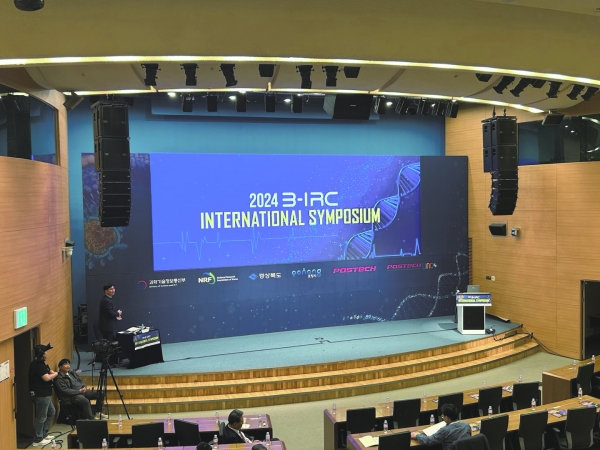
The 2024 B-IRC International Symposium was held on Nov. 8-9 at the POSCO International Center. The event was hosted by the Innovation Research Center for Bio-Future Technology (B-IRC) at POSTECH aiming to showcase advancements in cell and gene therapy (CGT) and bio-engineering research. Not only POSTECH students and professors, but also research groups from different universities and renowned professors and experts from around the world, joined the symposium, where they presented their latest findings. The Ministry of Science and ICT, National Research Foundation of Korea, Gyeongsangbok-do, Pohang-si, POSTECH, and the Korean American Society in Biotech and Pharmaceuticals (KASBP), supported the B-IRC International Symposium, contributing to the advancements of global communication in CGT research.
Although the official opening of the event was on Nov. 8, the poster session held on Nov. 7 served as an impression kick-off to this three-day event. During the poster session, research teams from various universities including POSTECH, Seoul National U niversity, and more, shared their outstanding research outcome with participants. Research on biotechnology, such as biomaterial for Rheumatoid arthritis therapy, advanced Plasma-FIB instruments for CGT, and metabolic engineering for immunology was introduced. The attendees also got a chance to actively participate in the event, by voting for posters they found most compelling.
Over the course of the next two days, speeches by distinguished professors were given across four sessions. The first three sessions were held on Nov. 8, the official opening day of the symposium, while the fourth session took place on Nov. 9. Session 1, titled “Polymer-and LNP-based drug delivery,” featured inspirational speeches by Professor Kazunori Kataoka (The University of Tokyo), Prof. Chae-Ok Yun (Hanyang University), and Prof. Qiaobing Xu (Tufts University). Each speaker, with their expertise in both chemistry and biology, presented how the application of chemical engineering to biotechnology could be a promising strategy. The second session, titled “New materials for drug delivery and regenerative medicine,” also showed how a chemically engineered system could be utilized in the field of CGT. Prof. Teruo Okano (Tokyo Women’s Medical University) presented his research in material-cell interaction and cell sheet engineering applied to cell sheet therapy, and Prof. Ki Dong Park (Ajou University) highlighted the application of injectable hydrogel systems in bioengineering. Prof. Dong Soo Hwang also showcased his research on exploring the chemical interaction and properties of coacervates.
Prof. Ashutosh Chilkoti (Duke University) and Prof. Ali Miserez (Nanyang Technology U niversity) respectively discussed the use of synthetic intrinsically disordered proteins and peptide coacervates in the field of CGT during session 3, titled “Coacervates as a drug delivery tool.” Prof. Sei Kwang Hahn, the final speaker of session 3, presented a more engineering-based approach. He described how a smart wearable optogenetic system, such as a smart contact lens, could be used for glucose-level sensing and drug delivery. The last session of the symposium was titled “Biology of liquid-liquid phase separation” and covered the relevant research on phase separation.
The first B-IRC International Symposium featured many inspiring speeches and notable research outcomes presented on posters, and served as a venue for global communication in CGT research. The success of the symposium may serve as another step forward for POSTECH in becoming a leader of CGT research.


